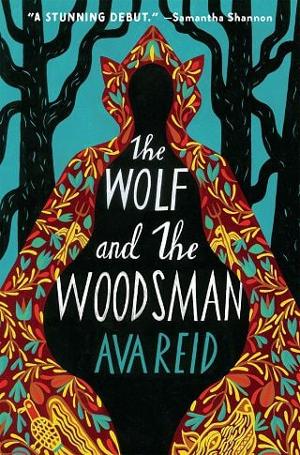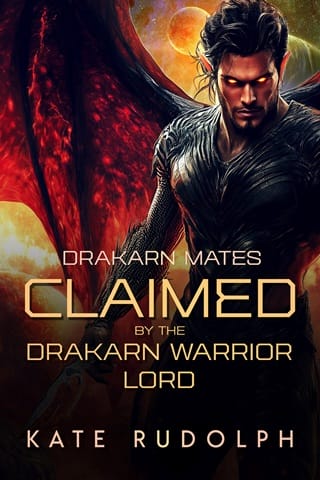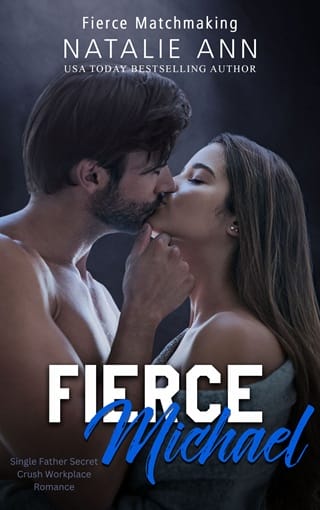Chapter Twenty
Chapter Twenty
I try to stagger to my feet, but Nándor places a gentle hand on my shoulder, squeezing my wound with just enough force to make me gasp. Pain blankets my vision in white.
“Stay down,” Nándor says. “I like the way you look when you’re kneeling.”
His nails feel as sharp as knives. I draw in a breath and reach for him, but before I can wrap my fingers around his wrist, he steps backward. The inertia sends me tumbling forward, catching myself on my hands. The floor is slick with my blood.
“How terribly heroic,” I bite out, “to send a serving girl to do your ugly work for you.”
Nándor stands up and walks over to where Riika has pressed herself against the wall, trembling. He runs a red-dyed finger down her cheek, and her face softens like challah bread fresh from the oven.
“I have friends everywhere, wolf-girl,” he says, looking at me while he grips Riika’s chin. “You should have figured that out by now.”
Friends in the Woodsman barracks and in the king’s council hall. I remember Count Reményi’s knifepoint eyes, sharpening as they found me in the dark. I remember Zsigmond shaking under Nándor’s stare, and the rabbi freezing like a frightened deer, and all the Yehuli children weeping. Anger cleaves through the pain.
“Then why did it take you so long to kill me?” I manage.
“You would have been dead your first day in the city if you’d been able to read my note,” he says. “I left it at your door, but I forgot that you wolf-girls are as dumb as dead fish, and can’t even spell your own names.”
I make a sound that’s almost a laugh: it was my own illiteracy that saved me, or at least prolonged my life. He must have invited me somewhere, perhaps pretending to be the king, and waited in the dark with a knife to cut my throat. And if he’d come to my room any other evening while I slept, he would have found it empty, too, since I have spent the past five nights at Zsigmond’s house.
“It won’t do you any good,” I say. The room, his face, all of it is blinkering with pale stars. “Even if I’m dead, the king will never name you. Not when there’s still a true-born son . . .”
I trail off, stuttering in agony. Nándor pushes off the wall and crouches down before me, his blue eyes so clear and cold I can almost see the ice in them still.
“Perhaps,” he says. “Perhaps not. Either way, you will not be alive to see it. Nor will you be alive to see Yehuli Street looted and empty, or your village turned to ash.”
I have no doubt that he means it, that he will turn his cold fire on Yehuli Street and Keszi the moment he gets the chance. I try to remember how many Woodsmen I saw in the crowd and calculate the number that the king still has on his side, but my mind feels like a frayed rope, only a few threads away from snapping.
“The king’s real heir lives,” I say, though my tongue tastes like copper and my eyes are starting to film. “And while he does, you have no chance of ever sitting the throne, unless you aim to rule by pagan right.”
I hope to see even a trace of disconcert on Nándor’s face, but he only smiles, such a beautiful, pure white smile that for just a moment I believe Szabín—that a chicken would bat its lashes at him while he butchered it.
“I know you have kept a close eye on my brother, as he has on you,” Nándor says. “I haven’t much wondered about why, since he came back to Király Szek with a bruise on his throat in the shape of your mouth.”
He knows. Of course he knows. Fear runs bleakly up my spine.
“What do you think my brother will do, when he sees your body?” Very calmly, Nándor begins untying the makeshift bandage I have knotted over my own shoulder. “What concessions do you think he will grant me?”
“Maybe he’ll thank you for it.” My voice is hoarse, nearly inaudible. “Then he’ll never have to confess to his sin. You’ll have taken care of his shameful problem for him.”
“I don’t think so, wolf-girl,” Nándor says. “I think that my brother will weep.”
And then he digs his fingers into my wound, pressing deep through flesh and sinew, nearly down to the bone. A hot, breathtaking pain bursts across my eyes, blinding me. I scream, but the sound of it is muffled by the blood in my mouth.
Gáspár was right. Nándor will torture me to death or madness, whichever comes first, just to make him falter. Even after I’m dead, I will damn Gáspár. Maybe my corpse will be the very thing that gets him killed.
Nándor withdraws his fingers. His hand is gloved in scarlet down to the wrist, but beyond that his skin is white and unblemished, as pure as the year’s first snow. He draws his hand up over my shoulder, along my collarbone, and closes a fist over my left breast.
“You missed,” he says, and at first I don’t realize that he’s speaking to Riika, not me. “I told you to aim for her heart. But I think she will die anyway—there’s certainly enough blood on my shirt.”
The front of his dolman is flecked with red. Against the wall, Riika has started weeping, her eyes squeezed shut.
“I’m sorry,” she whispers. I don’t know if she’s talking to Nándor at all.
The four fingers of my right hand curl over the stone floor. Above his collar, the pale column of Nándor’s throat is inches from my face, taut with muscle.
“Or maybe you’ll die first,” I say, drawing my lips back to show my teeth.
I raise my hand and rip open his dolman, tearing through the silk as if I have claws. I tear right down to his bare chest, just as pale and bright as the rest of him, blue veins straining under his skin like water under ice. Ördög’s threads go stiff around my wrist. Black marks feather across his skin in the shape of my fingers, my touch burning him right down to the bone. It’s a wound deep enough to kill.
Riika screams. Nándor topples back, a soft gasp escaping his lips. Blood washes over his ruined dolman, spilling onto floor like strewn flower petals, the precise color of poured wine. The light begins to drain from his eyes, a white moon slivering away, and he raises his hands. I think he might beg me for mercy and I smile at the prospect, in spite of my own dizzying pain.
Instead, he clasps his hands together and utters a quiet prayer.
The wound on his chest stitches itself back up, an invisible needle strung with invisible thread. Where his face has gone gray with lost blood it flushes pink again, the vibrant pallor of a living man. His skin is as immaculate as a frozen lake on midwinter’s coldest morning. Slowly, Nándor gets to his feet.
“Didn’t I tell you I was holy?” he rasps, as if death has not yet receded from his throat. “Would you like to try and kill me again?”
I search his body—what I can see of it—for evidence of sacrifice, any small ruination that will help me make sense of what I have seen. But I find nothing. No missing eye like his brother, no scars like Szabín. No lopped finger like me. He is unmarred by the toll that power usually takes.
It’s more terrifying than a thousand scars.
I collapse onto my hands and knees, quashed by fear and pain, as Nándor approaches me. He grasps the collar of my dress and hurls me onto my back, my wound flattening against the stone floor. My heart thrums so loudly in my ears that I can’t even hear my own scream.
“I’ll come back when you’re cold, wolf-girl.” Nándor’s voice floats above me, his face blurring and doubling behind the glaze that’s fallen over my eyes. “And then I’ll bring my brother to weep over your corpse. Or perhaps I’ll kill him first—if Godfather Death wills it.”
I try to make a sound, any sound of protest, but my lungs are like shriveled violets. I hear Nándor’s boots make their way toward the door, and then a softer set of footsteps, Riika scuttling after him. My vision ripples into black. Then there is the slide of a lock.
I don’t know how much time has passed, as life eddies from me. With every breath I can taste the metallic tang of my own blood, suffusing the air like a red mist. Through the lattice of my wet lashes, I can see the hearth, the stone floor, my abandoned wolf cloak and plum dress. My own arm, stretched out limply like a fallen branch, still swathed in pale-green silk.
Ever since the moment that Virág had her vision, I knew that I would die here in Király Szek, cold and alone. But how could I have known what would happen in between? The stretch of snowy road between Keszi and the capital, flecked with bright moments, like fires in the dark. Gáspár holding me in the cradle of tree roots, his breath damp and warm against my ear. All the nights we spent on the ice, and his arm around my waist as he pulled me up out of the freezing water. His mouth on mine, the red juice staining both of our tongues. The way he kissed my throat so gently that it felt like he was apologizing for any pain I had ever felt, whether it was his fault or not. Zsigmond embracing me, Jozefa smoothing the skirt on my lap, Batya feeding me challah. Seeing my own name etched on paper for the first time.
I try to hold each of those moments in my mind, like a butterfly in amber, encasing them in timeless suspension. But when I die, they will die with me. And it seems so terribly unfair, to leave Zsigmond and Gáspár, to leave Batya and Jozefa, alone with only their bitter memories, carrying a pain meant for two people.
And then, skimming underneath all these mortal contemplations, is the unadulterated animal instinct: I don’t want to die. Not now, not yet, at only five and twenty.
It is stubborn, bitter strength that forces me up, onto my knees and then my feet. I clamber toward the door. Pain is dragging at me like a wet dress. The door locks from the outside, to keep me in, a cow in her barn after all. I fumble at the iron handle, gathering all my will like kindling, and then setting it alight. The handle crumbles, and with it, the lock on the other side. The door groans open.
The relief of that small victory threatens to undo me. I slump against the wall, catching my breath, trying to make my vision steady. The hallway in front of me is feathering away between strands of black.
My plan forms in my body before it takes shape in my mind. I stumble down the corridor, one hand against the wall, blood painting a streak on the floor after me. I remember the way to Gáspár’s room hazily, as if I learned it in a dream. When I reach his door I half collapse upon it, my knees weakening under me.
For a moment, I hear nothing on the other side. Maybe he’s not there. Maybe Nándor has already come for him. Each terrible possibility runs itself ragged through my brain, and my vision has winnowed to nearly nothing by the time the door swings open, Gáspár standing openmouthed in the threshold.
“Évike,” he says, catching me before I fall.
He leads me into his room, and I crumple onto his bed. If my mind weren’t so pain-addled, and my lungs doing all their work just to keep me breathing, I would make a quip about someone finding the true-born prince with a wolf-girl in his bed. Even in my head, the jest is not half as clever as I would like.
My blood leaks onto his sheets. Gáspár holds my arm in his lap, gloved hands running over my wound.
“Tell me what to do,” he says, and the helplessness in his voice nearly ruins me. “Tell me how to . . .”
“Take off your gloves,” I manage, eyelids fluttering.
I watch him as he does, removing each one and letting them drift to the ground, limp as shed black feathers. “Why?” he asks. “What now?”
“No reason,” I mumble. “I’m just tired of you wearing them.”
He lets out a breath that is half annoyance, half exasperated amusement. When his bare fingers touch my skin through the dress, I feel them shaking.
“I have to stop the bleeding,” he says. His hand presses hard over my wound, and I let out a whimper of pain. “I’m sorry. It’s going to hurt. Try and bear it.”
The fabric of my dress is so blood-drenched that I can see the shape of my wound beneath it, wide and clenching. Gáspár pulls at the silk, but the seams hold fast. I hear panic in the hitch of his breath and then he leans over me, mouth so close to my throat that I think for a startled moment he will draw his lips over my old scar again. Instead he takes the fabric between his teeth, incisor grazing my shoulder, and pulls until the sleeve of my dress flowers open.
I remember how Imre stuck the hilt of his knife into Peti’s mouth and told him to bite down while Gáspár cut off his arm. Even then, even when he was only a Woodsman to me, there was horror and regret in his eye. Now Gáspár works with a black determination, his gaze narrowed to nothing but his hands and my bare, bleeding arm in front of him. He tears strips of fabric from his bedclothes and wraps them tight around my shoulder. The pain ebbs, if only slightly.
“I don’t know,” he says, his voice tight. “You’ve lost so much blood already . . .”
“It’s my hunting arm,” I say quietly. Even if I survive, I will never draw a bow again.
Gáspár’s face crumples. In that moment he looks so miserable that I want to apologize for every little cut I have made in him, every drop of blood my words have drawn.
“What happened?” he whispers.
And so I tell him everything: about the Yehuli holiday and Nándor’s mob, about Riika and the dagger, and every single one of his brother’s threats, and worst of all, about his brother’s terrifying power. Gáspár’s brow furrows as I speak, his lips pressing together until they are nearly white. As the pain recedes further, tidewater drawing back from the shore, I become aware of his hand against my arm, his bare knuckles brushing my skin.
“He wants to kill you,” I say at last, hoarse with exhaustion. “And then he’ll banish all the Yehuli, and destroy Keszi.”
Gáspár’s jaw sets. “It won’t be as easy for him as he thinks.”
“What do you mean?”
“I’m not as daft as you imagine me, Évike,” he says, but his tone is gentle. “I have Miklós and Ferenc switch off guarding my door while I sleep. I don’t eat anything unless I have procured it myself. When I must attend feasts, I let the wine touch my lips but I never swallow it. I know that I am what stands between Nándor and the crown, and that he will do anything to get his hands around my throat.”
My mouth goes dry. “He thought that killing me would make you drop your guard.”
Gáspár nods, just once, and doesn’t meet my eyes.
“None of it matters now.” A bolt of pain runs through me, and I shiver. “He’s too powerful. There’s no way to stop him. Even my magic was nothing against him.”
“Then you must let the king have her,” Gáspár says. “Your seer. It’s not the power of the turul, but it is enough to help my father hold on to his crown.”
“Katalin,” I say, my voice dropping like a stone kicked off a cliff. “Her name is Katalin.”
I see Gáspár’s face shift from bewilderment to realization, and then, abruptly, it hardens. “The girl who tormented you. The one who gave you that scar.”
His thumb brushes my left eyebrow, split by white scar tissue. Memories of blue flame bubble up, but they don’t wound me like they once did, now that I know Katalin is sitting in the king’s dungeon, perhaps even fettered in the same cell that I was.
“If I let her die, then I might as well admit that Virág was right,” I say. The confession of it feels shameful, poisonous, but Gáspár’s expression doesn’t change. “That she was right to cast me out, and that all of us wolf-girls are nothing more than warm bodies. Besides, it’s the same thing I told your father: a seer’s magic is not what you think. It will give the king only a fraction of the turul’s power.”
“Évike, think of what you’re saying.”
“I am,” I bite out, anger and despair washing over all the pain. “Don’t you understand how much I have thought of it? If I save Katalin, I will lose any power I have in this city, any sway over the king’s mind, and any ability to protect the Yehuli. To protect my father, I . . .” I can’t bring myself to admit what I am thinking: that when Zsigmond told me the story of the clay-man, he was begging me to be the one to save them this time. “You have no idea how much I have considered the weight of my words.”
Gáspár pulls away from me, lifting his chin. For a moment, his eye is as hard as obsidian. “You think I don’t understand? You were the one who told me, so long ago, that we were the same. You wielded that revelation like a weapon against me. My every action is a choice between honoring my mother and serving my father. You would be hard-pressed to find anyone who knows this strife better.”
Mortified, I press my lips together. I hadn’t thought he would remember my words so well, the words I hurled at him in anger, not knowing how much they would sting.
“I’m sorry,” I say, staring down at the floor. “For that and a thousand other petty cruelties.”
Gáspár doesn’t reply, but I hear the shift in his breathing. I feel like a blacksmith, everything I know laid out in pieces in front of me, and somehow I must forge a weapon from them. But any blade that I make will be double-edged. I cannot help Katalin without hurting my father. I cannot save the pagans without damning the Yehuli. And the only thing I know that might be strong enough to stop Nándor is a hundred miles away in Kaleva, just an orange flyspeck on the gray horizon.
I don’t know when I have become something so burdened by other people’s hopes and loyalties and lives. It almost makes me weep to think of it, how many people will die or be thrown out if I choose wrong. My head bows over my bent knees, pain still crawling up my arm like a glut of blackflies.
“The worst thing Nándor will do to the Yehuli is banish them.” My words taste so bitter I think I might die before I finish speaking them. “But he wants to burn Keszi to the ground.”
Gáspár gives a slow nod. His hand inches toward mine, but it only brushes the absence of my pinky. The space between us feels smaller than it ever has. If he knelt before his father to beg for my life, it seems only fair that I should humble myself to him now.
“Please,” I say. But when I raise my head, I see from the look on his face that he has already agreed.
Long shadows chase us down the hall, wraithlike fingers snatching at my wolf cloak. I don’t know if Nándor has already realized that I am gone, but I can’t waste the time turning around to check. I don’t stop until we’ve reached the top of the stairs that lead down into the dungeon, and even then, it’s only for a moment, to catch my breath. The wound on my shoulder is burning like a brand. I half walk, half stumble down the steps, reaching out for Gáspár to steady myself. My eyes keep fuzzing over the pinpricks of torchlight on the wall.
Katalin is in the same cell that I was, huddled against the mold-slick wall. Her pale hair is damp and tangled, and there’s another bruise pulsing on her perfect cheekbone. When she sees me, she rises, eyes sapphire bright and full of embattled loathing.
“What are you doing here?” she asks, voice low. “Come to deliver me to the king? How long were you in the capital before you decided to kneel to him?”
Her cruelty makes me regret my decision, but only for an eyeblink. I cannot watch another wolf-girl die, not even Katalin. I step forward and wrap my hand around the iron bar of her cell, Ördög’s threads going taut around my wrist. I close my eyes, and when I open them again, the bar is gone. I’m holding on to nothing, but my palm is orange with rust.
“How?” Katalin stutters out. “Could you always—”
“Do you think I would have endured half your wickedness if I could?” I interrupt, gritting my teeth as another wave of pain rocks through me. “Follow me.”
“Follow you where?” Her gaze darts between Gáspár and me. “I’m not going anywhere with you, or a Woodsman.”
Anger curdles in my belly. Despite my wooziness, I reach through the bars and grab her with my good arm, yanking her out of the cell.
“I’m saving your life,” I snap. “One more word and I’ll change my mind.”
Katalin fixes me with a cool stare. She slowly extricates herself from my grasp and then wipes her borrowed wolf cloak clean.
“Your hand is covered in blood,” she says.
This time, I scarcely resist the urge to strangle her and save King János the trouble. I look up at Gáspár, as if to steel myself, and the resolve on his face invigorates me. When we turn to walk back up the dungeon stairs, I hear the soft padding of Katalin’s footsteps behind us. She doesn’t speak again until we reach the top of the steps.
“You are bleeding,” she says, eyes wide.
I only nod, not particularly keen on explaining that I lost a battle of blades with a tiny serving girl.
“Here,” Katalin says. She pushes back my wolf cloak—her wolf cloak—and unties Gáspár’s makeshift wrappings underneath. I take a deep breath before looking at the wound, an ugly gash like an old woman’s blackened mouth. But Katalin only waves a hand over it, and the cut stitches itself shut.
I am deciding whether to thank her when Gáspár jerks me back into the threshold. A Woodsman’s shadow passes across the torchlit wall.
“How do you plan on getting us out of here?” Katalin demands, once the shadow has vanished.
“There’s another way out of the city,” says Gáspár. “Through the Woodsman barracks.”
I laugh at him openly. “You must be joking.”
“He’s joking?” Katalin scoffs. “What was your plan?”
There is enough blood left in my body for me to flush.
“They’ve all gone now,” Gáspár says, before Katalin can ridicule me further. “There are only the Woodsmen in my father’s retinue, who are stationed around the palace at night, and the ones loyal to Nándor, who are still at his side. The barracks are empty.”
Katalin makes a derisive sound, but she doesn’t argue. And then Gáspár leads us through the palace halls and down into another cellar, this one furnished with wood and crammed full of cots. Filmy bubbles of torchlight yellow the walls, illuminating the racks of weapons. Ax blades glint in blind crescents. Every mounded shadow looks like it could be a Woodsman in his black suba, but there are no footsteps on the ground except our own. Distantly, I hear a trickling of water, and as we go on, I see the wooden floors give way to slick gray stone. Like the church, the barracks have been built into the cliffside.
We gather what we can: a bow and quiver for me, a sword for Gáspár. Katalin’s mouth pinches shut as she watches; I can tell that she is repulsed by the prospect of wielding a Woodsman blade. Mercifully, she has not mentioned the wolf cloak that was once hers strung over my back. I was sure to retrieve it before we went down to the dungeon, its white fur matted with my blood. Maybe Katalin thinks me more worthy of it now.
My breath comes in white clouds as we pause at the mouth of a tunnel. Now that the pain has ebbed and my mind has cleared, there is room for all my misgivings, all my bewilderment and despair. I think of Yehuli Street and the taste of challah bread. I think of the star-dappled temple ceiling and the way my father held me to his chest. I may be damning them all.
“Évike.” Gáspár’s voice is stern, but not ungentle. “You have to come now. You’ve already made your choice.”
He is right, though the thought of it makes me want to weep. I follow him through the tunnel and out the other side, stepping into the cool wash of moonlight. Katalin’s hair and cloak are as pale as a dewy pearl.
Numbly, we go to the stables, saddling three black Woodsman steeds. They stomp the earth with a sound like far-off thunder. As we mount them, I stare and stare at the sweep of the landscape before us, the flat grasslands of Akosvár and the craggy topography of Szarvasvár. Beyond it, farther than I can see, winter is holding Kaleva in its white-toothed maw.
Above us, the city bells begin to sound. They are certainly spreading the word of our escape, of the missing seer, the cunning wolf-girl, the traitorous prince. Something hard and hot rises in my throat.
Gáspár’s brow is as heavy as a storm cloud, but his jaw is held tight. He spurs his horse on, and Katalin and I follow, leaving Király Szek behind.
 Fullepub
Fullepub 



